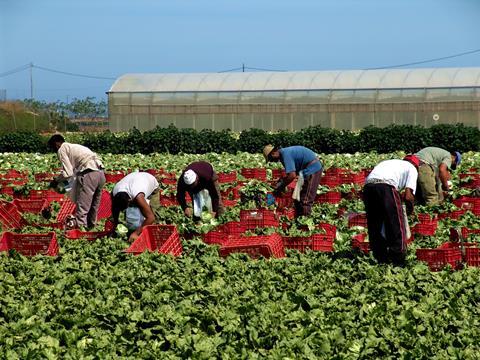Ethical Consumer says UK supermarkets have legal and moral obligation to ensure that the rights of workers they rely on are being met
A new report from Ethical Consumer is calling on UK supermarkets to take immediate steps to protect the rights of migrant agricultural workers in Spain after uncovering evidence of widescale abuse in the regions of Almeria and Huelva.

The UK not-for-profit cooperative claims fruit and vegetable farms in Spain are routinely breaking eight out of nine basic workers’ rights. Abuses include refusal of legal wages, forced labour, sexual assault and intimidation.
Aldi, Asda, Co-op, Lidl, Marks & Spencer, Morrisons, Sainsbury’s, Tesco, and Waitrose are named in the report.
“For 20 years, migrant agricultural workers in the Almeria and Huelva regions of southern Spain have faced flagrant abuses of their basic rights. They have been refused legal wages, fired for joining unions, forced to work in unsafe conditions, shouted at for taking toilet breaks and sexually assaulted and harassed,” the report states.
“As a 2022 report funded by the Spanish “government states, ‘The miracle of Spanish food exports would not exist without labour exploitation.’ This is especially pronounced in the regions of Huelva and Almeria.
The report found that eight out of the nine fundamental workers’ rights standards championed by UK supermarkets are being violated on farms in Almeria and Huelva. These include forced labour, unsafe working conditions, payment of less than minimum wage, excessive working hours, discrimination and sexual harassment.
“Considering their substantial buying power, supermarkets have enormous untapped potential to improve conditions for workers,” Ethical Consumer said.
“As a major market for Huelva and Almeria’s products, they could, should they choose to, push for real and meaningful change. Yet so far they have failed to take meaningful action, with supply chain policies and enforcement policies only applied to direct suppliers, and voluntary certification schemes and memberships failing to ensure compliance with basic workers’ rights at the farm level.”
The organisation pointed out that supermarkets have a legal and moral obligation to ensure that the rights of workers they rely on are being met.
UN special rapporteur on extreme poverty and human rights, Olivier de Schutter, states “For years, authorities and employers in southern Spain have been content to sit back and watch as migrant workers endure the most horrific, inhumane working conditions”. He continues:
“I urge supermarkets to end their complicity in this abuse and address the issue head-on, using this report as their guide.”
The report lists a number of immediate steps supermarkets should take to improve the situation for workers.
These including amending supply chain policies to apply workers’ rights requirements to all suppliers rather than only direct suppliers; publishing names and addresses of all supplier farms, including those beyond direct suppliers; and extending audits to suppliers throughout the supply chain for agricultural produce originating in these regions of Spain, including off-site worker interviews, ensuring that no management is present.
However, it notes that these steps alone will not be sufficient alone to address the endemic issues in the region.
“The key recommendation of this report is that UK supermarkets commit to supporting Worker-driven Social Responsibility (WSR) mechanisms as they begin to develop in the regions,” it states.
WSR mechanisms are worker-led models for change, under which workers define the conditions they want to see on farms and retailers make legally-binding commitments to only purchase from suppliers that ensure those conditions are met. According to Ethical Consumer, they are considered the “emerging gold standard” for worker rights and have transformed the lives of workers.
“This approach transforms traditional approaches to corporate responsibility by: i) centering the experiences and knowledge of those on the ground; ii) ensuring enforcement is truly independent of both retailers and producers; iii) and defining legally-binding processes to ensure that retailers take an active role in remedying violations in their supply chains,” the organisation said.



